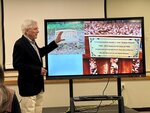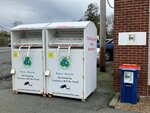Representative Howitt supports $915 million economic development bond bill
Boston – State Representative Steven Howitt, R-Seekonk is supporting a multi-million dollar bond bill designed to promote job creation and retention in the Commonwealth. The bill passed the House of Representatives on a vote of 152-1 on July 7.
House Bill 4461, An Act relative to job creation, workforce development and infrastructure investment, authorizes more than $915 million in borrowing over the next five years. It also addresses a variety of policy initiatives ranging from zoning reform and college savings tax incentives to liquor licenses and fantasy sports regulation.
“This bill includes a combination of targeted investments and more far-reaching policy changes to help promote economic development in the Commonwealth,” said Representative Howitt. “It offers a wide range of options to assist employers and municipalities with creating jobs and boosting the state’s economy.”
The bond bill includes $500 million requested by the Baker-Polito administration to recapitalize the MassWorks infrastructure program. This authorization will allow the administration to issue its first new round of grants for public infrastructure economic development initiatives this fall as part of a “one stop shopping” program to assist cities and towns.
Also included in the bond bill is a $107.5 million earmark requested by Massport for upgrades at Conley Terminal in South Boston, which is New England’s only full-service container terminal. The new funding, which will be used to leverage federal matching funds, will allow for the creation of an additional berth outside Logan Airport flight paths and the purchase of new cranes to accommodate the larger ships that are now passing through the terminal.
To assist families saving for college tuition costs, the bill provides a tax incentive program for contributions made to a prepaid tuition or college savings program established by the Commonwealth, more commonly known as 529 plans. A deduction of up to $1,000 will be allowed for single filers, married taxpayers who file separate returns, and those filing as heads of household, while a deduction of up to $2,000 will be allowed for married taxpayers filing jointly.
The bill also adds language clarifying that fantasy sports are legal in Massachusetts and may operate under regulations set forth by Attorney General Maura Healey. In addition, the bill creates a commission to study the regulation of fantasy contests, including the implications for existing gaming in the Commonwealth. The commission will have until March 1, 2017 to submit its final report and provide any recommendations to the Legislature.
To address the recent controversy over whether Nashoba Valley Winery should be allowed to hold licenses to serve homemade wines, beers and spirits at both its vineyard-distillery and its on-site restaurant, language was included in the bill to clarify that licenses can be held to both manufacture and serve alcohol. The bill also allows businesses to obtain licenses to operate both a restaurant that serves alcohol and a grocery store that sells, but does not serve, alcohol.
The bill also contains changes to state zoning laws, including a proposal to encourage communities to create “starter home” zoning districts.
Other capital spending proposals in the bond bill include:
• $71 million in matching grants for Massachusetts colleges and universities to participate in the National Network for Manufacturing Innovation federal initiative;
• $15 million for the MassDevelopment Site Readiness Fund to facilitate pre-development permitting and marketing initiatives;
• $15 million for grants and loans to municipalities, private property owners and businesses to support community development and innovation through the Innovation Infrastructure Fund;
• $45 million to facilitate the clean-up and reuse of sites contaminated by hazardous waste and pollutants;
• $45 million to revitalize Gateway Cities under MassDevelopment’s Transformative Development Initiative;
• $15 million in research and development matching grants for the state’s universities and research institutions;
• $30 million to support training and education programs to address workforce shortages in the manufacturing, technology and hospitality industries;
• $15 million to provide incentive payments to communities that create dense residential or mixed-use smart growth zoning districts;
• $45 million in competitive grants for establishing, upgrading and expanding career technical education and training programs aligned with regional economic and workforce development initiatives; and
• $2.4 million to encourage dual enrollment partnerships between school districts and public higher education institutions to allow high school students to earn free college credits toward an associate degree.
The economic development bond bill now heads to the Senate for further action.


















Comments
No comments on this item Please log in to comment by clicking here